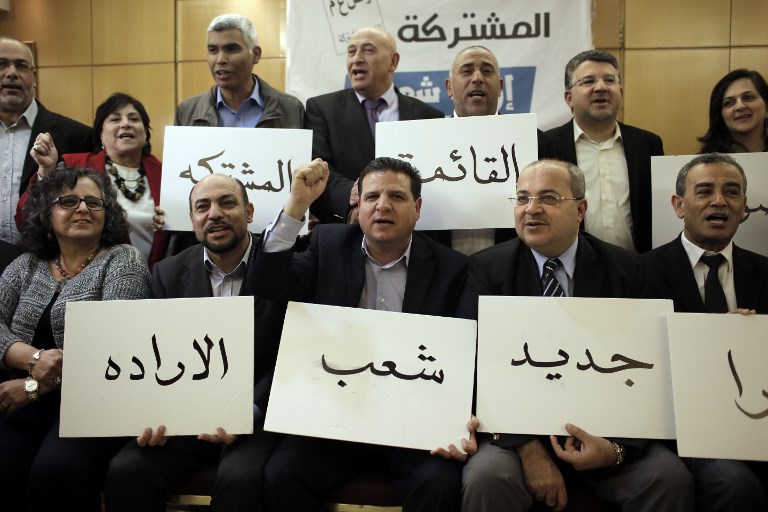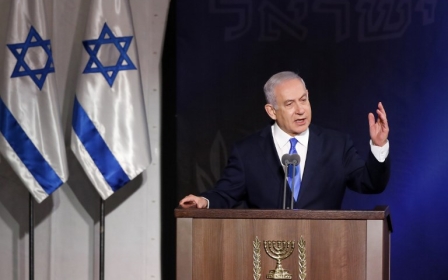The collapse of the Joint List is a wake-up call for Palestinian politicians

Palestinian political parties recently submitted their lists to the Central Elections Committee in Israel. They are no longer running in one Joint List, as they did in the 2015 elections, where they formed an alliance that won 13 Knesset seats and was portrayed as “the will of the people”.
It seems that the will of the people was valid for one term only. Much speculation and analysis has been circulating over the reason for the collapse of the Joint List, but one thing is sure: none of the previously united parties have anything to say about it in their campaign, beyond an exchange of accusations.
This time around, "the will of the people" is apparently being expressed by running in two separate lists. The Democratic Front for Peace and Equality (Hadash) has teamed up with the Arab Movement for Change, while the National Democratic Assembly (Balad) and the United Arab List will run together in a separate alliance. These moves came after several days of talks that led nowhere.
Narrow partisan interests
What does this mean for Palestinian citizens of Israel? It could be the final nail in these parties’ coffins.
New MEE newsletter: Jerusalem Dispatch
Sign up to get the latest insights and analysis on Israel-Palestine, alongside Turkey Unpacked and other MEE newsletters
While the Joint List was ushered in with high hopes and expectations for the last elections, people’s faith in them has plummeted. No matter what they tell the electorate, one point will stand out above the rest: they couldn’t make the greater public interest prevail over their narrow partisan interests.
The Joint List was an outcome of two factors. First, it was in the parties’ own self-interest not to lose their representation in the Knesset after Israel in 2014 raised the electoral threshold from two percent to 3.25 percent. Secondly, it was the result of a popular demand, born of public fatigue over the competition and power struggles among parties.
The alliance promised a lot when it was created, but has offered nothing new to the people. It was the same politics, the same problems, the same discourse
Yet, these two factors were not enough to cement such an alliance forever. These parties have long been competing over power and representation among Palestinians.
Four years of working in the framework of the Joint List were apparently not enough to dismantle the hostility they had built up towards each other; they failed to use this opportunity to hold serious discussions on how to build a collective project to counter Zionism.
As for the popular demand, it does not seem to be as strong in 2019 as it was in 2015. Many have expressed disappointment at the Joint List’s performance. The alliance promised a lot when it was created, but has offered nothing new to the people. It was the same politics, the same problems, the same discourse.
Strategic failure
Even at times of great challenges, such as the recent passage of the nation-state law, the Joint List failed to offer a united front with a clear agenda or strategy. Many observers have raised concerns that the alliance had no clear vision, instead relying on the improvisation of individual Knesset members.
As a national community facing enormous challenges under Israeli apartheid and colonisation, this is not the way politics should be conducted.
The main trap leading us to this point has been the parties’ total reliance on Knesset elections. This has been their ultimate focus in terms of fighting against the state’s discrimination and oppression.
And while politicians kept repeating the mantra that elections were only one strategy among many, the truth is that they never worked seriously to develop other strategies in a collective manner.
This total reliance on the Knesset has a pragmatic, yet problematic dimension. Parties can’t afford not to be represented in the Knesset, because this is their only source of financing; without it, they would collapse. Each party receives a monthly budget from the state for each Knesset seat they hold, hence the fight to gain more seats.
This is a serious factor, and unfortunately the parties have not devised a way to reduce this dependence.
Obsession with seats
The obsession with winning seats also has significant implications for the parties’ relationships with their constituencies. Constituencies become a mere electoral force, rather than people who politicians should engage, educate and involve in the struggle and the political process.
This situation has fuelled the public’s lack of commitment and involvement in party politics, enabling the rise of opportunists with no driving ideology beyond their own self-interest.
No matter how these elections end - whether these parties manage to pass the threshold or not - they must understand that without a real, meaningful change in their attitudes, they are on their way to obscurity.
The collapse of the Joint List can thus be seen as a wake-up call and a great opportunity for parties on two fronts. Internally, it is a call for a rebellion against traditional, egocentric leadership and failing politics. Externally, it is a call to engage in a meaningful discussion with the electorate - to regain their involvement, commitment and faith.
The views expressed in this article belong to the author and do not necessarily reflect the editorial policy of Middle East Eye.
Middle East Eye delivers independent and unrivalled coverage and analysis of the Middle East, North Africa and beyond. To learn more about republishing this content and the associated fees, please fill out this form. More about MEE can be found here.







